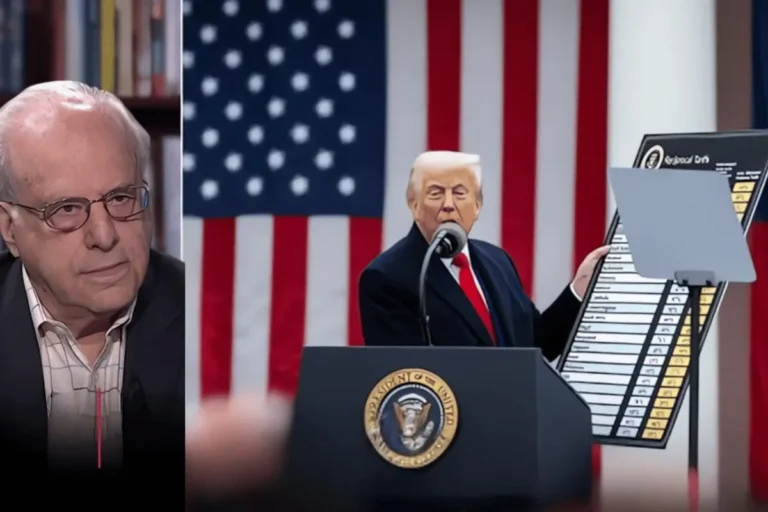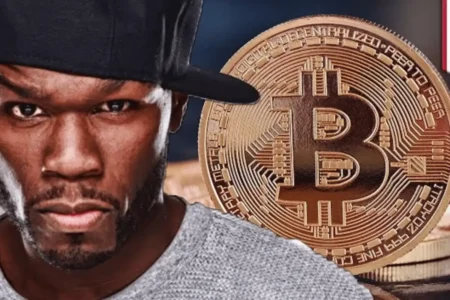Last week, my buddy Dave texted me a screenshot of his grocery bill — $8 for a box of cereal. He added, “Did they start putting gold flakes in this or what?” Turns out, it’s not gold. It’s tariffs. And it’s hitting all of us way harder than we expected.
When President Trump announced massive new tariffs covering goods from nearly 185 countries, calling it “Liberation Day,” most Americans barely blinked. Maybe they thought tariffs were something that only big companies needed to worry about.
Spoiler: they’re not.
And now, an economics professor has broken it all down in the simplest, and scariest, way possible.
What Actually Happened?
- On April 2, 2025, President Trump rolled out a 10% blanket tariff on almost all imported goods.
- China got hit even harder — facing a total 54% tariff on their products.
- Trump framed it as the day American industry was “reborn.”
- Global stock markets tanked immediately after the announcement.
He wasn’t kidding when he said it would change history. Problem is, not everyone agrees it’s changing things for the better.
Enter Professor Richard Wolff, an economics heavyweight from the University of Massachusetts and the New School, who went on national TV and basically said, “Hold my beer.”
Tariffs Sound Patriotic… Until You Read the Fine Print
First, let’s get real about what a tariff actually is.
It’s a tax. Period.
When a company imports something into the U.S., they have to pay Uncle Sam at the border. Then, they turn around and shove that cost onto — drumroll — you and me.
Professor Wolff joked that Trump’s claim that “other countries pay the tariffs” is about as true as Mexico paying for the wall. Spoiler again: that didn’t happen either.
Meaning?
- Higher prices on almost everything — from sneakers to smartphones to avocados.
- Inflation that hits regular people way before billionaires feel a thing.
- American companies using the excuse to quietly jack up prices even more.
Basically, it’s like getting punched twice and being told it’s for your own good.
Why Tariffs Could Be a Recession Trigger
Wolff warned that this whole move is like tossing a match onto a dry field.
Here’s why:
- Prices go up → people buy less.
- Buying less → companies sell less.
- Selling less → companies fire workers.
- Firing workers → less money in the economy.
See the problem?
Tariffs don’t just hurt the countries we’re taxing. They boomerang back and slam our own economy. Hard.
And when countries like China, Japan, and South Korea hit back with their own tariffs?
Yeah, it gets even uglier.
America vs. The Rest of the World?
In the old days, if America sneezed, the world caught a cold.
Now? If America starts a food fight, the rest of the cafeteria just moves tables.
China, Japan, and South Korea are already teaming up to form new trade deals — cutting the U.S. out. Europe’s not far behind. Professor Wolff pointed out that the U.S. is isolating itself, and fast.
At the U.N., votes keep going against the U.S.
In global trade talks, other countries are building workarounds.
It’s like being that kid at recess who thinks he’s winning… until he looks up and realizes no one wants to play with him anymore.
Fans and Critics Are Fighting Over It
The debate online is messy:
- “Finally! A president standing up for American jobs!”
- “I’m tired of seeing ‘Made in China’ on everything.”
- “Wait, why does my TV cost $300 more now?”
- “Thanks, tariffs. My rent didn’t go up this month… but my groceries did!”
Even Sean Fain, president of the United Auto Workers union, supported the tariffs. Sort of.
He said tariffs could bring back jobs if companies played fair.
But even he admitted he’s worried about fired federal workers, lost export markets, and skyrocketing inflation.
Translation:
Yeah, it’s a cool idea in theory.
In real life? It’s way more complicated.
Quick Breakdown: Winners and Losers
Winners (maybe):
- A few American factories.
- Companies that can raise prices without much competition.
- Politicians who can claim “we’re fighting for you” during election season.
Losers (definitely):
- Regular shoppers.
- Families living paycheck to paycheck.
- Small businesses that depend on cheap imported goods.
- Farmers who sell crops overseas and now face retaliation.
But Wait… Was There A Master Plan?
Some people, like former Greek finance minister Yanis Varoufakis, think Trump knows exactly what he’s doing.
Varoufakis argued that tariffs were designed to shock other countries’ central banks into lowering their interest rates. That would weaken their currencies and — weirdly — help cancel out the tariff pain for Americans.
Professor Wolff’s take?
Nah.
He called it wishful thinking.
Tariffs are like playing Jenga drunk — you might think you know what you’re doing, but every move makes the tower wobble worse.
Big Picture: America’s Empire Is Fading
Here’s the gut punch nobody wants to talk about.
Wolff said the United States isn’t the big boss anymore.
- The U.S. and its G7 allies make up about 28% of the world’s economy.
- China and its partners (BRICS) now account for about 35%.
That’s right — the new kids on the block are already bigger than the old crew.
And every time the U.S. throws a tariff tantrum, it just speeds up the shift.
Instead of countries running to Washington for deals, they’re heading to Beijing, New Delhi, and São Paulo.
It’s happening. Whether we like it or not.
A Few Weird Side Effects You Didn’t See Coming
- Milk prices could spike — Tariffs hit imports like feed and fertilizer too, so cows get expensive.
- Video game consoles might vanish — Many parts are assembled across Asia.
- Electric cars could get pricier — Even though they’re made in America, a lot of their batteries aren’t.
Oh, and remember when people joked about buying iPhones for $6,000?
If this keeps up, it might not be a joke much longer.
So, What’s Next?
There are a few possible roads ahead:
- Massive inflation, where wages can’t keep up and everyone feels poorer.
- Major trade wars, making goods even scarcer.
- New alliances, with Europe, Asia, and Africa building stronger ties — without us.
And the wildest part?
There’s no clear Plan B.
It’s basically a Hail Mary pass, hoping something — anything — lands right.
Final Thought
If you think tariffs are just some boring economics thing that doesn’t affect you, think again.
The next time you’re standing in Target, holding a $10 bag of frozen peas and wondering what happened to the world, remember:
Tariffs are taxes.
You’re paying them.
And right now, they’re shaping the future way more than any one election or headline.
Maybe it’s time for all of us — from the White House to the Walmart parking lot — to ask the real question:
Are we fixing anything, or just slapping higher price tags on everything and calling it freedom?
Either way, don’t lose that receipt. You might need it when your cereal hits $15.







